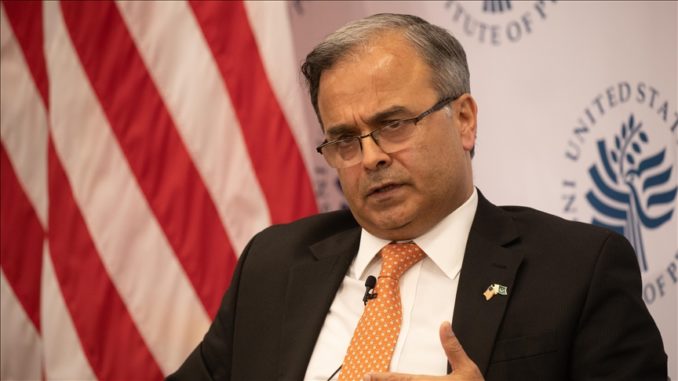
Tensions between Pakistan and India have de-escalated but the situation is still critical, Pakistan’s Ambassador to Washington said late Monday.
Speaking on a panel at the U.S. Institute of Peace, Asad Majeed Khan said immediately after Pakistan’s move to hand over the captured Indian pilot, two soldiers and some civilians were killed in attacks at Pakistan’s border check points.
Majeed Khan went on to say that India continues to threaten the region’s peace and security, even though Pakistani Prime Minister Imran Khan emphasized that the problems can be solved through dialogue.
In this case, Pakistan will continue to defend itself, he noted.
Last week, Indian jets entered Pakistan claiming to have killed several terrorists inside a training camp of Jaish-e-Mohammad (JEM), a militant group that claimed responsibility of a suicide bombing that killed more than 40 Indian troops in mid-February.
Pakistan, which has banned JEM since 2002 but is accused by India of providing the group a sanctuary, denied the claim saying the Indian jets had dropped bombs at empty forestland.
Relations between the two nuclear-armed neighbors further soured when warplanes from both sides engaged in a dogfight along the border of disputed Kashmir. India and Pakistan claimed to have downed each other’s planes and an Indian pilot was captured.
In a move to quell tensions, Pakistan handed over the captured pilot to Indian authorities last Friday.
The U.S., EU, Turkey and many other states have urged both countries to resolve their differences through talks.
The two South Asian nations have fought three wars in 1948, 1965 and 1971 — two of them over Kashmir — since they were partitioned in 1947.
Additionally, touching upon Afghan peace process, the ambassador said Pakistan wants to see Afghanistan reconciling with itself and its neighboring countries.
Efforts to find a lasting settlement to the Afghan conflict have gathered momentum in the last six months, with many players — including Turkey, Russia and the U.S. — getting more engaged in the peace process.
Moscow hosted two peace conferences within four months between the Afghan government and the Taliban aimed at national reconciliation in the war-torn country.
Writing by Faruk Zorlu
BY ANADOL AGENCY
